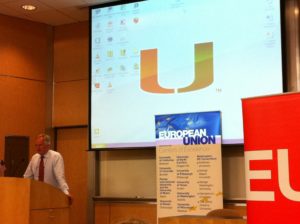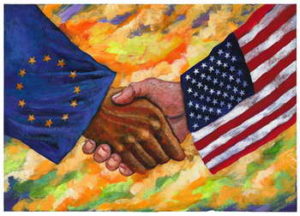Identifying “strategic partners,” argued Christian Leffler, has become the main priority of the EU in order to remain relevant on the international stage. This strategic assessment was part of a presentation by Christian Leffler, Managing Director for the Americas (North, Central and South America and the Caribbean) at the European External Action Service (EEAS) entitled: “The EU, the Americas and Globalization.” During his lecture – clear, sharp and very relevant – in front of a full auditorium at the University of Miami, Christian Leffler tackled the very important questions of the role and contribution of the EU in this ever-more globalized arena.
As a true European diplomat, he started his presentation with the success story of the EU since its creation. The mention of the founding fathers, Jean Monnet and Robert Schuman, was central in order to describe the genius of these two men in order to “make war unthinkable, and materially impossible.” Integration through deep economic interdependency was the best way, at the time, to overcome the security divisions between European states. However, it did not stop at economics; Mr. Leffler raised an interesting point when claiming that the EU had been involved in international affairs since its early years. The colonial possessions of powerful Member States such as France, the Netherlands and later on Britain, soon became a European problem. The period of decolonization taking place in Africa and other parts of the world led to major political discussions in Europe. As per Leffler, France, the Netherlands, and Britain were more than happy to share the burden of responsibilities with the EC.
The second most important event in the making of the EU as a global actor was the end of the Cold War with the fall of the Berlin Wall in 1989. Quite interestingly, Mr. Leffler claimed that until the collapse of the Soviet Union, the EU – at the time the European Communities – “had had the privilege to behave irresponsibly internationally.” He meant that regionally the security of Europe was provided by NATO; and internationally by the UN. In other terms – read neorealist paradigm – the EU would have been identified as a free-rider. But in the 1990s, the EU had to rethink its role and itself in two ways. The first one, was that until the 1990s the EU was an “ever closer union among the peoples of Europe” and consisted only of “Western governments.” The fall of the Wall opened up the door to the enlargement of the Union from 12 to 27, and soon 28 Member States. Most of the new members were under Soviet influence. The second aspect was that right after the fall of the Wall the EU needed to change and update its policies and structures in order to strengthen the collective engagement of Europe around the world. In many ways, the EU was better placed than some Member States to work on certain issues at the international level, especially on questions of trade.
Following the historical development of the EU, Mr. Leffler tackled the question of globalization and the European ease in dealing with the global forces. Globalization is a concept that is fairly understood, and contributed to the rise of new problems and challenges. Most of them – organized crime, terrorism, climate change, and so on – can only be solved through cooperation and multilateralism. Leffler claimed that the EU is the most adequate structure in order to deal with these cross-cutting issues as it has been confronting for decades the same types of cross-cutting issues domestically. At the global level, EU is a fervent believer in multilateralism – in the 2003 European Security Strategy and the following 2008 Report on the Implementation of the ESS, the concept of “effective multilateralism” has been at the heart of the EU global strategy – and regional integration in order to solve problems.
Linked to these notions of multilateralism and cooperation, Mr. Leffler underlined that the main role of the EU has become to identify ‘strategic partners’ around the world. These partners are identified as being a group of countries with enough influence that they can either set-up or block a specific agenda. These strategic partnerships are fluctuating and change according to the issues. The EU learned the hard way of the centrality of these strategic partners during the COP15 meeting on climate change which took place in Copenhagen in 2009. At that time the EU did not have partners in order to advance to its agenda; neither did the US. Learning from the strategic errors of the COP15, the EU was able to secure Mexico as a partner during the COP16 and in the last one, COP17, the EU was able to team up with Brazil and the CARICOM countries. This strategic partnership in Durban for the COP17 was central in order to advance the agenda on climate change.
 However, according to Leffler, if there is one strategic partner that has not changed: the U.S. The U.S.-EU relations have been strong since the creation of the Community in the ’50s and have remained a pillar, despites some temporary highs and lows. He argued that the U.S. orientation towards Asia “does not change the strategic partnership at all.” It should be instead seen as recognition by the U.S. of the stability of Europe. Finally Europe does not represent a threat to the survival and security of the U.S. This point needs to be put under parentheses. The survival of the U.S. from a military standpoint is a certainty, however from a financial and economic standpoint it is quite different. The stability and influence of the U.S., as an economic world leader, depend on the economic and financial situation of the Eurozone.
However, according to Leffler, if there is one strategic partner that has not changed: the U.S. The U.S.-EU relations have been strong since the creation of the Community in the ’50s and have remained a pillar, despites some temporary highs and lows. He argued that the U.S. orientation towards Asia “does not change the strategic partnership at all.” It should be instead seen as recognition by the U.S. of the stability of Europe. Finally Europe does not represent a threat to the survival and security of the U.S. This point needs to be put under parentheses. The survival of the U.S. from a military standpoint is a certainty, however from a financial and economic standpoint it is quite different. The stability and influence of the U.S., as an economic world leader, depend on the economic and financial situation of the Eurozone.
Despite the very interesting presentation and Q&As, one point remained untouched: how has the global aura/legitimacy of the EU on the international stage been affected by the eurocrisis? Has the eurocrisis changed the perceptions of the EU by countries of the global south? And has it affected the power and influence of the EU globally? The rise of the ‘rest’ has been a major concern of the EU and the U.S. Their global influence and relevance is at stake. How will the EU survive in the future multilateral world order?
This conference was organized by the EU Center of Excellence at the University of Miami. The list of events organized by the Center can be found at: www.miami.edu/eucenter